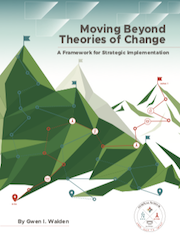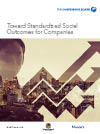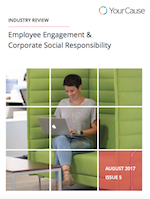Site Search
- resource provided by the Forum Network Knowledgebase.
Search Tip: Search with " " to find exact matches.
A corporate member asked for what other corporations do regarding employee’s goal and objectives. Do they include volunteerism or volunteer activities as part of an employee’s review, or their annual goals?
Grantmakers Concerned with Immigrants and Refugees (GCIR) in collaboration with National Committee for Responsive Philanthropy (NCRP), present a briefing that features a panel of speakers representing nonprofit organizations working on the front lines to strengthen our democracy and advance immigrant rights in their communities. Don’t miss this opportunity to hear what groups need as we move into 2025 and beyond, directly from movement leaders.
According to a report from National Committee for Responsive Philanthropy, since 2012 there has been an 11 percent shrinkage in philanthropic funding towards immigrant movement groups. While there was an uptick in rapid response funding between 2017-2018, this has not created the conditions for the long term sustainability of immigrant serving organizations.
In a critical election year, over 60 anti-immigrant bills have been introduced in state legislatures nationwide. Immigrant advocacy groups – already facing a myriad of historically systemic challenges such as burnout, unlivable wages, and hostile state level political environments – are facing this wave of anti-immigrant sentiment, often at the sacrifice of their own safety and well being. And while philanthropic interest has focused on the national elections and scenario planning, movement groups are already planning for 2025 and an uncertain future regardless of presidential election outcomes. Philanthropy must not only meet this moment but also invest in the critical infrastructure needs of organizations and movements, particularly at the local and state levels.
As right wing movements seek to undermine our democracy on all fronts, immigrant communities cannot be left behind and must be included in any political, social, or philanthropic efforts that seek to build a multi-racial democracy. Built through the collaborative efforts of GCIR and NCRP, this briefing will feature a panel of speakers representing nonprofit organizations working on the front lines to strengthen our democracy and advance immigrant rights in their communities. Don’t miss this opportunity to hear what groups need as we move into 2025 and beyond, directly from movement leaders.
Cost: Free for Funders
Must log in or create an account to register on GCIR’s website.

Effecting systemic change through philanthropic initiatives requires not only a strategy but a well-constructed implementation plan focused on "people, partners, and platforms.” According to a new report, Moving Beyond Theories of Change: A Framework for Strategic Implementation, philanthropic organizations hoping to achieve impact must align the partners, approaches, and organizational commitments before they begin to design programs, issue Requests for Proposals, or even hire staff. The report further suggests frameworks should include diversity, equity, and inclusion (DEI) efforts and partnerships with intermediaries and donor collaboratives.

A new pilot study from The Conference Board and the Impact Genome Project® (IGP) introduces standardized social outcomes to help measure and compare the performance of societal investments. The standardized outcomes allow for benchmark metrics, including efficacy rates and cost per outcome. The study used data from 16 companies whose funding contributed to nearly 650 nonprofit programs. The benchmarks provide new insights into the effectiveness of corporate societal investments.

Twice a year, the YourCause team publishes our Industry Review focused on evaluating employee engagement and corporate social responsibility programs. This report uses performance data collected by the YourCause Employee Engagement platform between January and December of 2016. We identify trends, activities and benchmarks in employee engagement and corporate social responsibility. Our clients, industry peers, and other interested parties may use this data as a barometer for performance measurement.
The William Penn Foundation commissioned a study to move beyond the anecdotal and see if and how students benefited from being involved in some of its grantee arts programs. The research by WolfBrown, working with Johns Hopkins University, showed that participating in the arts help students develop traits that contribute to later success in life. Younger students especially showed measurable growth in characteristics like tolerance for other points of view, an understanding that hard work can develop their knowledge and abilities, and their motivation to achieve.
There is widespread and growing recognition in the nonprofit sector about the importance of evaluation — not only for measuring impact, but also for improving programs and better serving communities. While grantmakers generally see evaluation as necessary, most are not yet investing enough resources in this area.
This guide discusses six principles for successful evaluation capacity building. By applying these principles, grantmakers can make the most of our evaluation investments and help our grantees become more effective and sustainable organizations.
In Q2 2021, our foundation awarded 29 grants totaling over 12 million dollars. Of these, 9 grants were new, while 20 were renewals. Our Q2 grantmaking aligns with our updated funding model, which focuses our work on identifying and fueling the scale of cost-effective programs and solutions that accelerate improvement in key academic and socioemotional outcomes for all children. Inspired by venture philanthropy, the model puts an emphasis on grantmaking and strategic support that unlock innovation, evidence, and growth.
In Q1 2022, our foundation awarded 41 grants totaling over $12 million dollars. Of these, 17 grants were new and 24 were renewals.
Our first quarter grantmaking aligns with our updated funding model, which focuses our work on identifying and fueling the scale of cost-effective programs and solutions that accelerate improvement in key academic and socioemotional outcomes for all children. Inspired by venture philanthropy, the model puts an emphasis on grantmaking and strategic support that unlock innovation, evidence, and growth.
